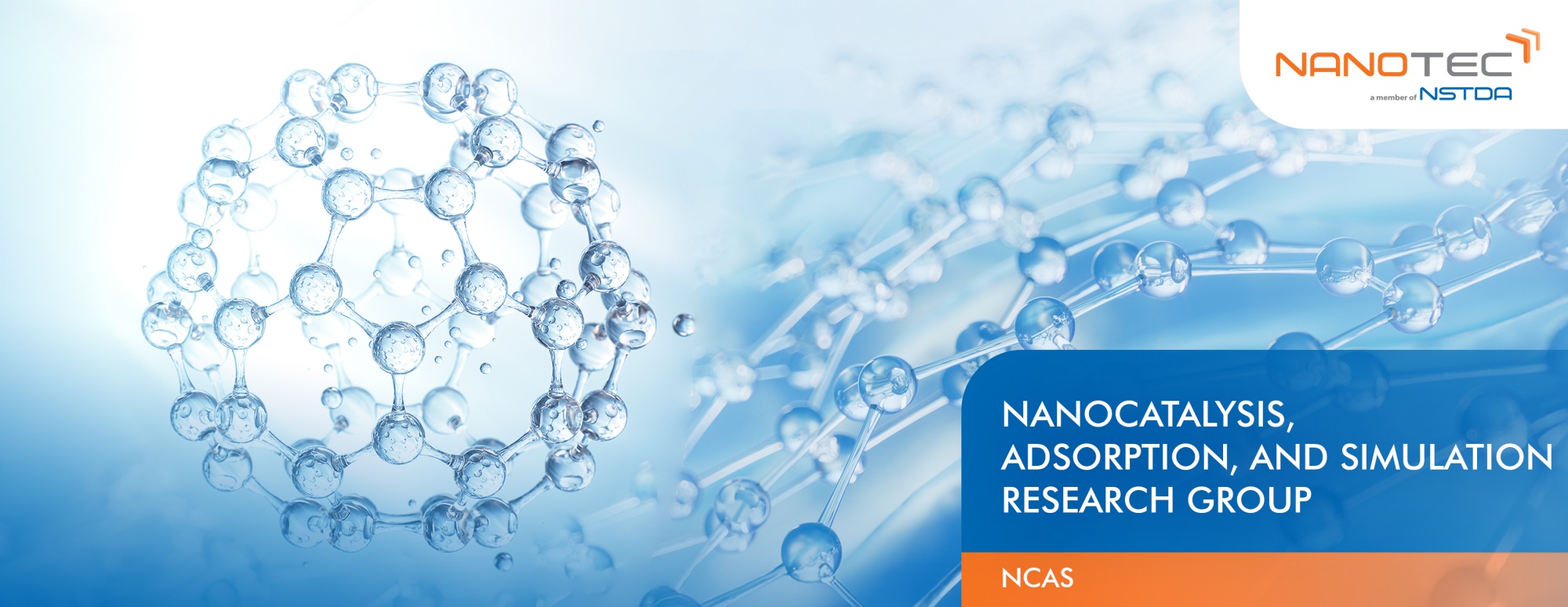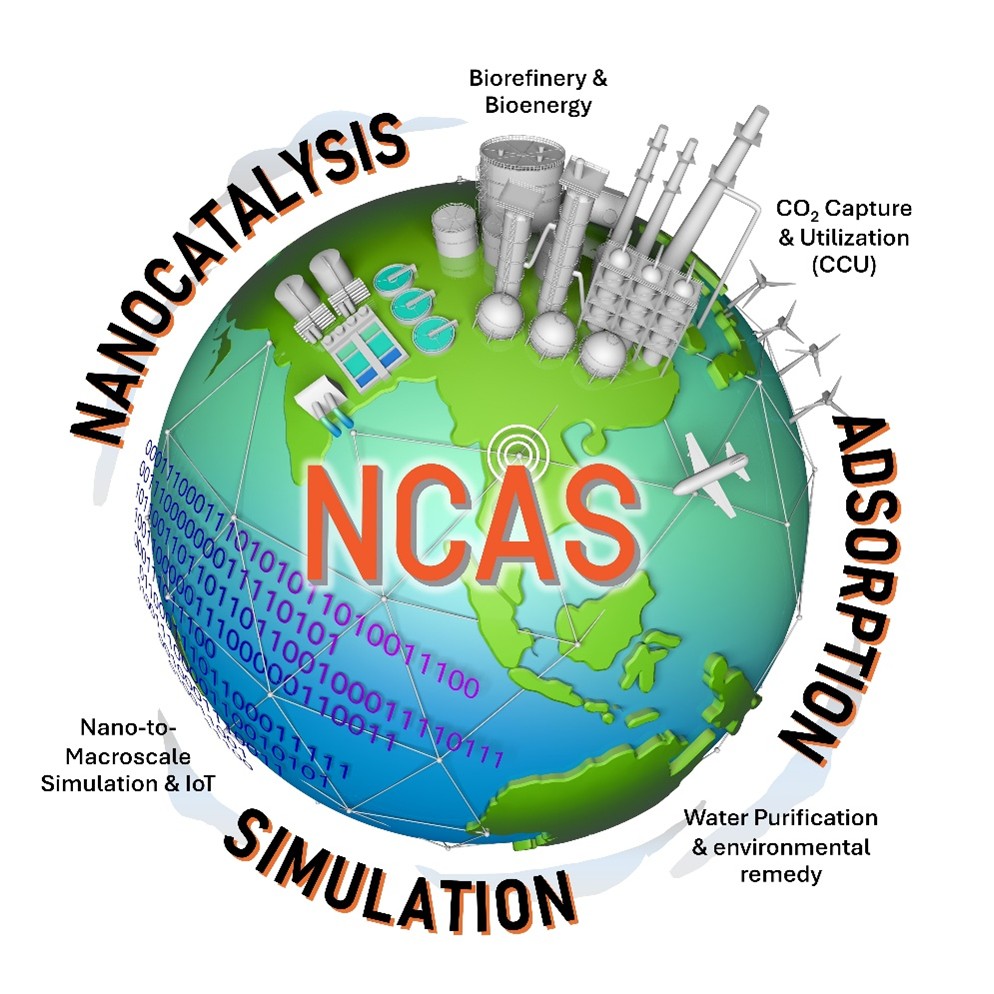
NANOCATALYSIS, ADSORPTION, AND SIMULATION RESEARCH GROUP
Nanocatalysis, Adsorption, and Computational Research Group (NCAS) is a research group under the National Nanotechnology Center (NANOTEC), focusing on Innovative research in the design, synthesis, fabrication, and engineering of nanomaterials for environmental and energy applications. This involves experimental processes combined with computational chemistry techniques and networking systems for monitoring and control (Internet of Things, IoT). The research areas include: 1) catalysts, adsorbents, selective membranes, and advanced nanomaterials such as nanocarbon, metal-organic frameworks (MOFs), nanocomposites, and nanolignocellulose; 2) CO2 capture and utilization processes, biofuel production, clean renewable energy, bio-based chemicals, value-added chemicals, biomaterials, and environmental remediation processes; 3) computational research and development, including the use of various simulation techniques from the atomic scale to the macroscale, as well as IoT for the analysis and diagnosis of critical national issues. The goal is to elevate NANOTEC as a leading research and development organization in nanotechnology within ASEAN and NCAS will be an international research unit integrating nanotechnology applications for sustainable economic development and improved quality of life.
Key Research
Key Research 1 : Carbon Capture and CO2 Utilization Process
Materials and system technologies for carbon dioxide (CO2) capture and utilization through thermochemical, electrical, and photochemical catalytic processes to produce high-value and essential products for industries, including syngas, methanol, olefins, and nanocarbon for the energy and plastic industries. Direct carbon or CO2 capture using solid adsorption technology and indirect capture (nature-based carbon capture) through biomass intermediates with technologies such as Activated Nanocarbon, Biocoal, and Biojet (SAF) for the energy industry and BCG, aiming for carbon neutrality in Thailand.

Awards
- Outstanding Research Award for the Fiscal Year 2023 & 2024 from the National Research Council of Thailand (NRCT)
- L’Oréal Thailand For Women in Science Research Fellowship for the year 2024
- Silver Medal Award in the Research, Invention, and Innovation Competition at the SPECIAL EDITION 2022 – INVENTION GENEVA EVALUATION DAYS in the Swiss Confederation
Event/conference/competition related to the award
1.NRCT Invention Day 2023 & 2024
- L’Oréal Thailand Research Fellowship “For Women in Science” Grant Award Ceremony for 2024
- The Research, Invention, and Innovation Competition at the SPECIAL EDITION 2022 – INVENTION GENEVA EVALUATION DAYS in the Swiss Confederation (online)
Key Research 2 : Improving the quality of water for consumption that is contaminated with public health affected pollutants through technology and innovation.
Most community water supply systems or village water supply systems in Thailand have been installed for a long time, causing both the structure and the equipment used to deteriorate. Additionally, with the worsening quality of raw water, there is an increase in contamination of chemicals and toxins, which affects health conditions and leads to more illnesses. Many places also lack proper maintenance, resulting in lower efficiency and higher costs, to the point where some areas have had to stop providing services altogether. Our research team has conducted studies to address these issues from multiple perspectives. We have developed innovative materials for absorbing chemicals and heavy metals using surface nanocoating and modifying techniques, such as doped/modified activated carbon, modified bone char, and coated ceramic materials for filtration and absorption. We also applied community waste materials like banana peels and eggshells, which are readily available and effective in reducing contaminants in drinking and household water. In addition, our team has also developed methods to improve the efficiency of water production systems, such as using PAC (Poly Aluminium Chloride) instead of alum for better coagulation, installing improved surface tube/lamella settlers to enhance sedimentation efficiency and reduce sand filter clogging. In managing process challenge, we develop portable turbid tube devices (TurbidTubeTM) for accurate raw water turbidity measurement. This device works with portable jar test kit (Mini Jar testTM) to test sedimentation chemical in water samples before applying them to actual water production systems. This solution helps system operators determine the optimal amount of chemicals needed for coagulation without requiring standard laboratories or expensive equipment, reducing water production costs and minimizing environmental and health risks from excessive chemical use. The main goal of our innovation is to enable communities to manage their water production processes sustainably and to standardize them using appropriate technology.
Awards
Popular Vote Award for Best Exhibition Booth
Event/conference/competition related to the award
The 2nd Learning and Innovation Community Award
Key Research 3 : Data-Driven Discovery of Graphene-Based Dual-Atom Catalysts for Hydrogen Evolution Reaction with Graph Neural Network and DFT Calculations
We developed high-precision artificial intelligence models to discover new, low-cost, and highly efficient catalysts to replace platinum for green hydrogen production. By creating efficient computational methods to evaluate catalyst properties quickly, we can significantly reduce the time and resources required for laboratory experiments in viable catalyst design. Since the accuracy of artificial intelligence depends on the quality of its training data, our main focus was on establishing a robust database for learning. Our research team developed a specialized catalyst database for machine learning (deep learning). We utilized a crystal graph convolutional neural network (CGCNN), a highly efficient AI model architecture capable of learning chemical structure and electronic properties without manual feature extraction. Applying this CGCNN in conjunction with density functional theory computational methods enables a highly efficient and accurate search for new catalysts.
Award
Research Award (2024) from National Research Council of Thailand (NRCT))
Contact Us
Dr.Nuttaporn Pimpha
Email : nuttaporn@nanotec.or.th Tel : 02-564-7100

